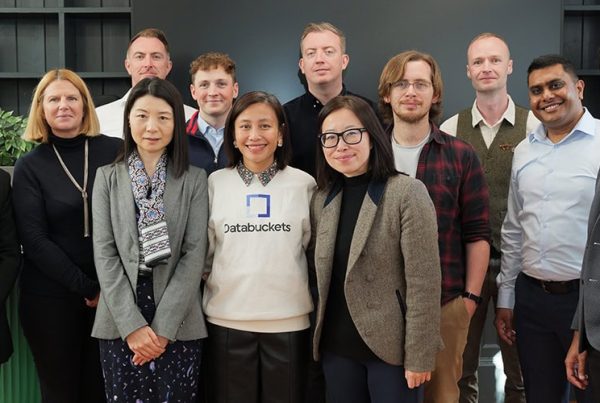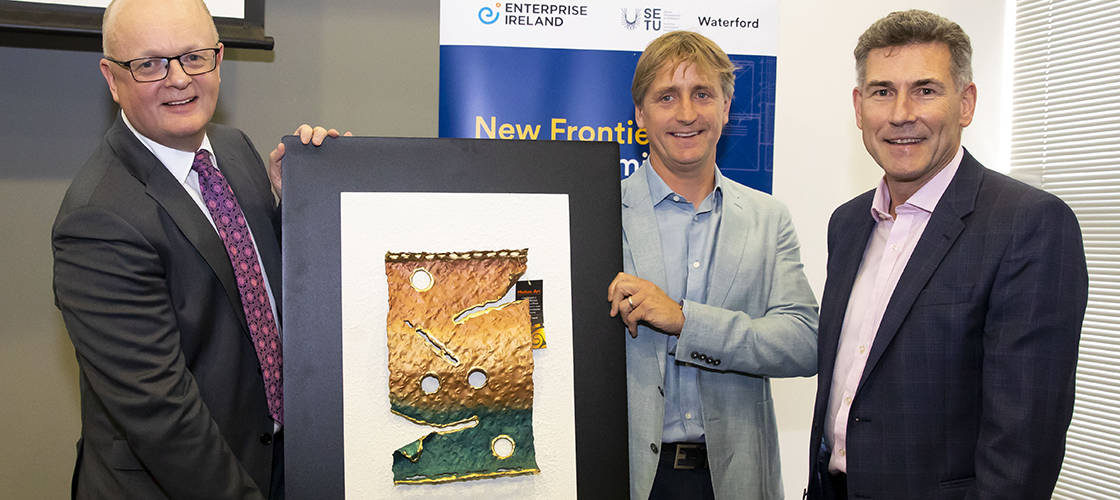
Dermot O’Shea and Ronan Quinlan founded Taoglas nearly two decades ago. Dermot participated on the precursor to the Enterprise Ireland New Frontiers programme, the South East Enterprise Platform Programme (SEEPP), which was run by our Programme Manager in Waterford, Dr Eugene Crehan. Taoglas has grown from strength to strength, and at their recent graduation Showcase and Awards event, South East Technological University (SETU) in Waterford inducted Dermot into their New Frontiers Entrepreneurial Hall of Fame.
Enniscorthy-headquartered Taoglas is a leader in complex Internet of Things connectivity solutions. Its technology is applied in areas as diverse as mobility and infrastructure, transportation, smart industry, connected health, smart cities, and even in space. Earlier this year, the company made a deal with private equity backer Graham Partners that values the business at around $200 million.
Dr Eugene Crehan interviewed alumnus Dermot about his experience of SEEPP and his learnings from nearly 20 years growing a cutting-edge business.
Eugene: What motivated you to set up Taoglas, and what challenges did you face in the early stages of your business? I know that your co-founder, Ronan Quinlan, was based in Taiwan and you were in Wexford.
Dermot: My co-founder and I met in Taiwan. We both wanted to work in global Irish technology company and we both aspired to be entrepreneurs. Also, I think we had a great work ethic. We had both worked in the electronics industry for some time before that and were looking for opportunities in that area. After trying some different products and ideas, we were offered some GPS antennas from a vendor we were working with – used in Sat Nav units at the time – and they were an instant hit with many potential clients building GPS into their product for tracking or location-based services.
The biggest initial challenges were financial and size-related, for example, how do you hire people to do complex projects? Or, how do you win large customers as a small and new business? Building credibility while building up your cash flow so that you can deliver what you’re promising is tough. The first year of the business, the planning stage, happened in Taiwan where we were both based. Then my wife and I moved back to Ireland and registered the business here, as we wanted an Irish headquartered business with Taiwanese excellence in manufacturing. We’re still an Irish headquartered company today, and the name TaoGlas means ‘The Green Way’.
Eugene: Why did you join SEEPP and what did you hope to get from it?
Dermot: When you start up, you’re always wondering what you’re missing and what you’re not doing. It was like a kind of paranoia, I suppose. I registered for a Start your own Business course with the local Enterprise Board [Ed: the predecessor of Local Enterprise Offices] to refresh my business skills in areas such as cash flow, profit and loss, marketing, etc. Because we had an international business, the Enterprise Board pointed me towards the South East Enterprise Platform Programme (SEEPP). It had more content relevant to growing an international business. And that’s how I met you and came onto the programme.
Eugene: How did you find the programme? Did it meet your expectations?
Dermot: The programme offered a bit of everything. Apart from the funding support, it could also help out with relevant expenses. Let’s say you’d identified an important opportunity in the USA, the programme would contribute towards the cost of your flights to go there. But the financial support was only one aspect.
A big benefit was the interactions with the other participants. Typically, as a founder, you’re working away on your own in some temporary office in the attic or the garden shed. On the programme, we were all developing international business but there was a good variety of business ideas so none of us were in direct competition. There was a lot of camaraderie and we made connections that would last forever. That was really special.
But also, I have to say that the content of the programme was excellent. There were experienced business founders coming in to share knowledge in areas you might not even think about. I remember learning about how to really leverage the power of websites back when company sites were no more than a basic brochure. This encouraged us to think of our site as an interactive tool, which gave us a competitive advantage over bigger, more established companies. It was very educational.
“There was a lot of camaraderie and we made connections that would last forever. That was really special.”
What’s great as well is that you have kept in touch with all of us ever since. You don’t miss an opportunity to say good things about us and promote the business when you can. It really is a network for life.
After the SEEPP, we became an Enterprise Ireland client. One of the first things that EI did was match me up with a mentor, an experienced businessman who didn’t hesitate to tell me some very hard truths about the business. I found that really valuable. Whenever we needed support from EI, especially the overseas offices, they didn’t hesitate to pull out all the stops. A few years ago, we won some European Space Agency funding which is managed here by Enterprise Ireland, so at the moment we are working closely with them on that.
Eugene: How did you stay motivated and focused during challenging times when growing Taoglas?
Dermot: You have to have a true belief in yourself and the journey. You will launch products that don’t work. You will do stupid things. But that’s OK as long as you bounce back. To build a sustainable business, you need to build resilience. We’ve been through the recession, through Covid, and through the current supply chain issues because resilience is part of our culture at Taoglas.
As the founder or CEO, you can’t expect every day to be a great day. If things go right; you have to give everyone else the praise. If things go wrong, you have to take the blame. But it’s not the great days that define you. It’s the daily grind, the dedication, the ability to take the knocks and keep going. You don’t win business because your website is the best; you win it because you’re able to get in front of the right customer and convince them to choose you.
Regardless of whatever other drama is happening in the background, you keep on the mission. Persistence and hard work are what really pay off in business. If you’re in it for the champagne and unicorns, you’re better off going to Hollywood.
Eugene: At our event, you talked about the importance of work-live balance. As the CEO of a large company with teenage children, how do you maintain a work-life balance and what strategies do you use to avoid burnout?
Dermot: I didn’t have any strategies until six or seven years ago and that’s why I ‘burned out’ in 2017 and had to make some changes. Most CEOs and entrepreneurs are excellent at putting a good spin on things, especially in Ireland. “Everything’s fine! My arm’s falling off but everything’s OK!” We never want to say there’s anything wrong in the business, and of course that makes sense to a certain degree. You don’t want customers thinking things aren’t going well. So, it becomes second nature to keep saying everything is great. Maybe that’s why so many CEOs and founders feel lonely, in the early days especially.
My advice is don’t isolate yourself. Stay connected – talk to mentors, have coffee with a peer, go and talk to your customers. Some people don’t do well working from home because it is isolating, so get out there and be with other people.
“Persistence and hard work are what really pay off in business. If you’re in it for the champagne and unicorns, you’re better off going to Hollywood.”
For a while, I made the business the most important part of my life. I have to keep reminding myself that it isn’t, in fact, the most important thing. It’s maybe the fifth or sixth thing on my priority list now, and even our investors know that. Because if I’m not good and things aren’t good in my family life, I’m not going to be a good CEO. Now I work fewer hours, but I work more effectively and I feel that I perform better and can handle more stress. Experience helps as well, after 20 years in the job I’ve seen most things and problems that would have seemed impossible to deal with before are just bumps in the road now.
I made changes in my life such as giving up alcohol, eating better, and travelling less. I also built a management team that takes on some of the things I used to handle myself. It’s a process, and I think a lot of people forget that you have to work on yourself and not just the business. Some people have this mentally of, “If I go on this business course, everything will be better.” Actually, they’d probably be better off getting therapy or going to the gym or taking some time out. Entrepreneurs aren’t great at admitting weaknesses, but we should try to change that.
Eugene: I know you have ambitious plans for the business. How do you identify and evaluate new business opportunities, and do you have criteria to determine whether to pursue them?
Dermot: Yes, I have a very scientific process called my gut instinct. Well, that’s part of it anyway. I do have 20 years of experience and I also know who to ask for feedback on ideas. In the business, we have an innovation committee that works with our engineers, salespeople, customers, and suppliers to understand where the market it going and what types of products we should work on. This means that if we launch something that no one wants to buy, which we have done, we should have some early warning signs that it might be a bad idea. It’s not good to just decide for yourself and then hope for the best, so we have people and processes in place to help.
But at the end of the day someone – you – has to decide if it’s a go or no-go on a particular project. The data, feedback, numbers, experiences, analytics are good information, but you go with your gut instinct at the end of the day. If it’s wrong, you can adapt and change and will feel comfortable with that because it was your decision. If you had gone against your gut, that would be a really frustrating. Luckily, we have enough projects and products that we aren’t reliant on any one thing for success.
I do have ambitious plans for the business. If I look ahead 10 years, similar things are happening at Taoglas but hopefully we have more products in more markets. There are a few new areas I’m interested in exploring, like marine, mining, and maybe defence. We’ll have added new component lines, effectively creating more products that we can sell to our existing customers. We also aim to do one acquisition each year, allowing us to sell our products into new markets.
Last year, the company hit its target turnover of €100 million; our target is now €1 billion by 2030. After that, we’ll no doubt be chasing a target of €10 billion. But beyond that, we want to have a great company culture, with 12 or 13 locations around the world and up to a couple of thousand employees. I want Taoglas to be a great, fun company to work for.
Dermot O’Shea receiving his award at SETU
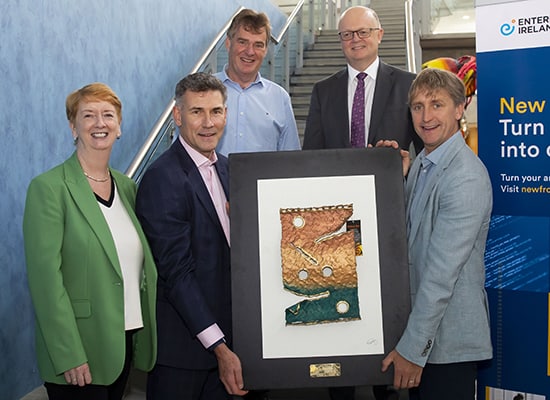
(l-r front) Paula Carroll, National New Frontiers Manager at Enterprise Ireland; Dr Eugene Crehan, New Frontiers Programme Manager at SETU – Waterford Campus; and Dermot O’Shea, CEO of Taoglas. (l-r back) Brian Fives, Senior Development Adviser at Enterprise Ireland and Dr Tom O’Toole, Dean of the School of Business SETU
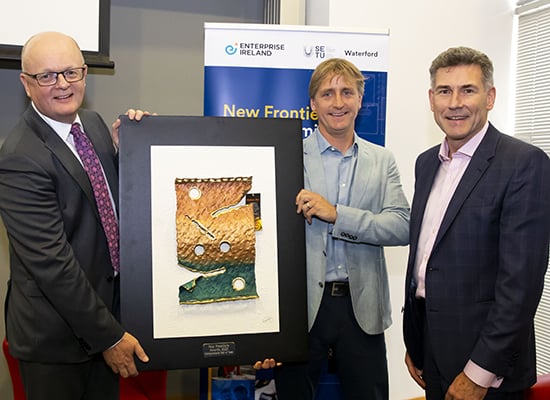
(l-r) Dr Tom O’Toole, Dean of the School of Business SETU; Dermot O’Shea, CEO of Taoglas; and Dr Eugene Crehan, New Frontiers Programme Manager at SETU – Waterford Campus
Our congratulations to Dermot on his induction to the SETU New Frontiers Hall of Fame. Dermot joins two prior SETU inductees, David Whelan of XR Engage in Waterford and Edward Hendrick of Sonru in Wexford. Read more about the ceremony on the SETU website.
Read more about the awards ceremony and the recent graduates of New Frontiers at SETU – Waterford Campus, including award winners Praveen Kaur of Uoto, Chris McGarry of Migim, and Susan O’Neill of Sulu Solutions.
Recent articles
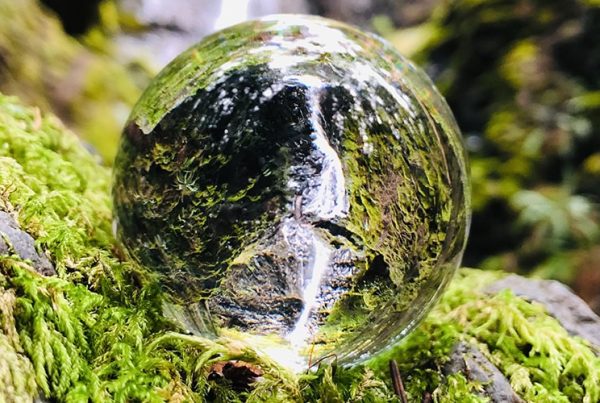
Founder Perspectives: Lessons From Building Businesses In Sustainability

Tech Startups In The Age Of AI: Alumnus Paul Savage On Speed, Quality & Risk
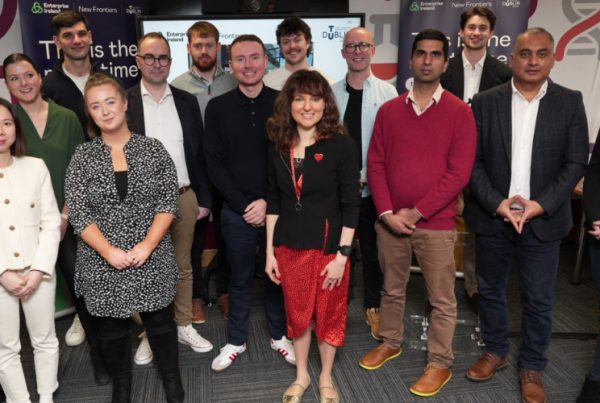
Fourteen Startup Founders Graduate From Phase 2 Of New Frontiers In Tallaght
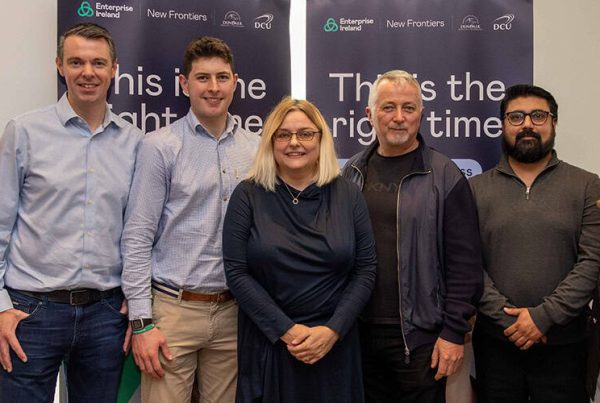
Eleven Founders Graduate From New Frontiers In The Border Mid-East Region

Laying The Right Groundwork Helps Startups Prepare For Export Success
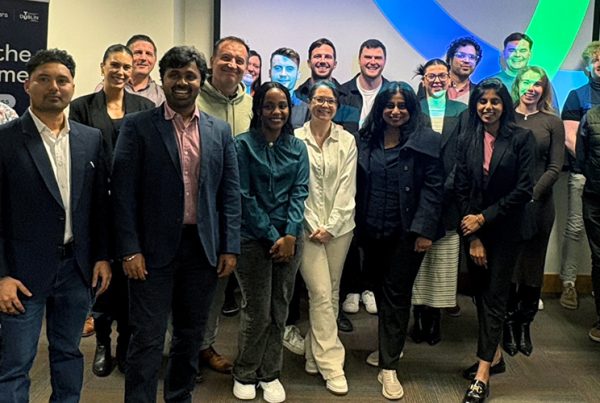
Startup In Dublin: Learn More About New Frontiers On TU Dublin’s Grangegorman Campus
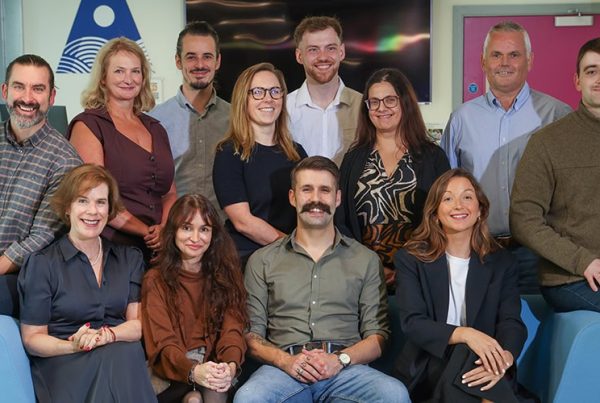
Michael Furey On The Success Of Ronspot: “The Most Important Thing Is Research”
